名词性从句的翻译
名词性从句翻译
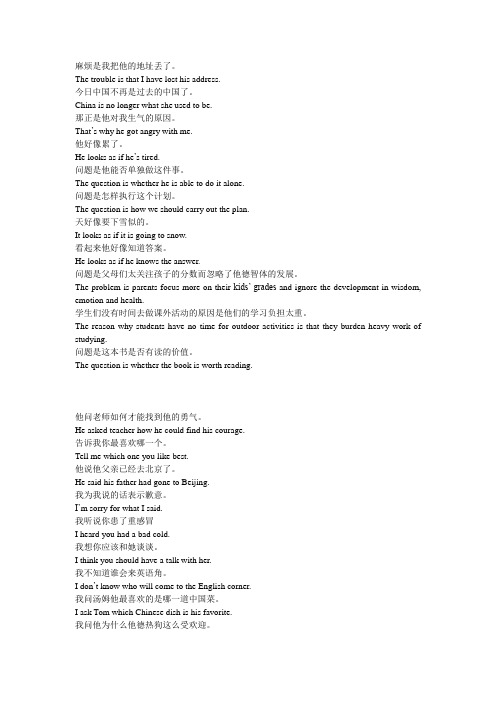
麻烦是我把他的地址丢了。
The trouble is that I have lost his address.今日中国不再是过去的中国了。
China is no longer what she used to be.那正是他对我生气的原因。
That’s why he got angry with me.他好像累了。
He looks as if he’s tired.问题是他能否单独做这件事。
The question is whether he is able to do it alone.问题是怎样执行这个计划。
The question is how we should carry out the plan.天好像要下雪似的。
It looks as if it is going to snow.看起来他好像知道答案。
He looks as if he knows the answer.问题是父母们太关注孩子的分数而忽略了他德智体的发展。
The problem is parents focus more on their kids’ grades and ignore the development in wisdom, emotion and health.学生们没有时间去做课外活动的原因是他们的学习负担太重。
The reason why students have no time for outdoor activities is that they burden heavy work of studying.问题是这本书是否有读的价值。
The question is whether the book is worth reading.他问老师如何才能找到他的勇气。
He asked teacher how he could find his courage.告诉我你最喜欢哪一个。
Tell me which one you like best.他说他父亲已经去北京了。
英语八大从句类型例句
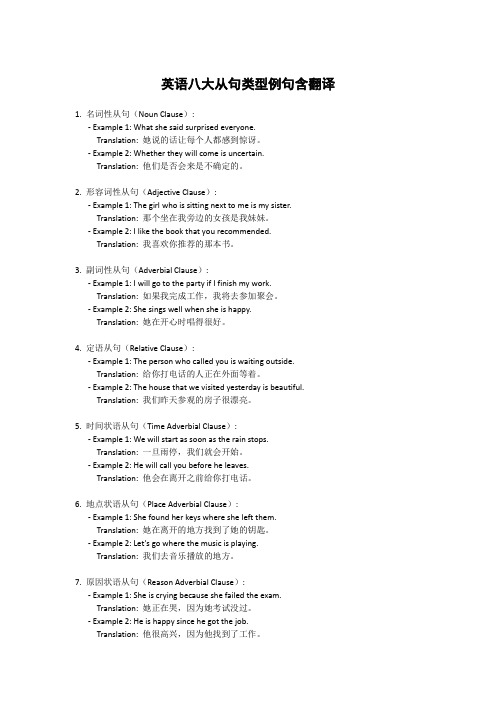
英语八大从句类型例句含翻译1. 名词性从句(Noun Clause):- Example 1: What she said surprised everyone.Translation: 她说的话让每个人都感到惊讶。
- Example 2: Whether they will come is uncertain.Translation: 他们是否会来是不确定的。
2. 形容词性从句(Adjective Clause):- Example 1: The girl who is sitting next to me is my sister.Translation: 那个坐在我旁边的女孩是我妹妹。
- Example 2: I like the book that you recommended.Translation: 我喜欢你推荐的那本书。
3. 副词性从句(Adverbial Clause):- Example 1: I will go to the party if I finish my work.Translation: 如果我完成工作,我将去参加聚会。
- Example 2: She sings well when she is happy.Translation: 她在开心时唱得很好。
4. 定语从句(Relative Clause):- Example 1: The person who called you is waiting outside.Translation: 给你打电话的人正在外面等着。
- Example 2: The house that we visited yesterday is beautiful.Translation: 我们昨天参观的房子很漂亮。
5. 时间状语从句(Time Adverbial Clause):- Example 1: We will start as soon as the rain stops.Translation: 一旦雨停,我们就会开始。
英语从句的翻译
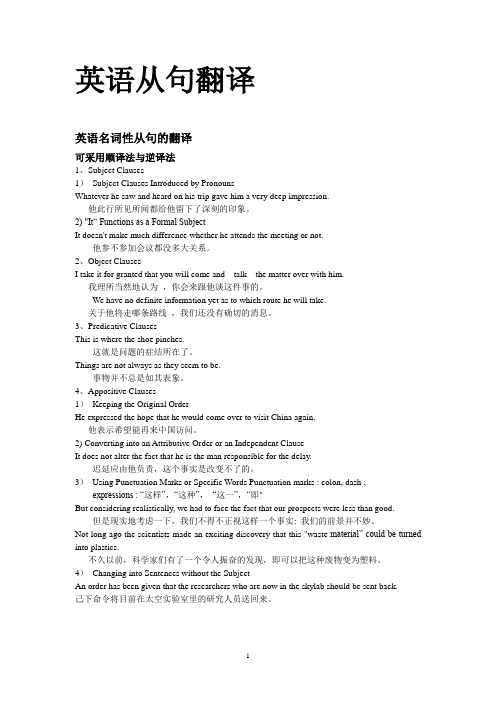
英语从句翻译英语名词性从句的翻译可采用顺译法与逆译法1、Subject Clauses1)Subject Clauses Introduced by PronounsWhatever he saw and heard on his trip gave him a very deep impression.他此行所见所闻都给他留下了深刻的印象。
2) "It“ Functions as a Formal SubjectIt doesn't make much difference whether he attends the meeting or not.他参不参加会议都没多大关系。
2、Object ClausesI take it for granted that you will come and talk the matter over with him.我理所当然地认为,你会来跟他谈这件事的。
We have no definite information yet as to which route he will take.关于他将走哪条路线,我们还没有确切的消息。
3、Predicative ClausesThis is where the shoe pinches.这就是问题的症结所在了。
Things are not always as they seem to be.事物并不总是如其表象。
4、Appositive Clauses1)Keeping the Original OrderHe expressed the hope that he would come over to visit China again.他表示希望能再来中国访问。
2) Converting into an Attributive Order or an Independent ClauseIt does not alter the fact that he is the man responsible for the delay.迟延应由他负责,这个事实是改变不了的。
名词性从句汉译英
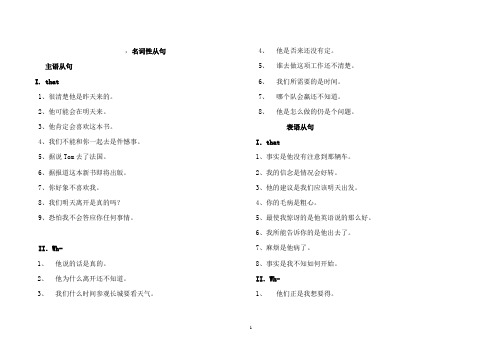
,名词性从句主语从句I. that1、很清楚他是昨天来的。
2、他可能会在明天来。
3、他肯定会喜欢这本书。
4、我们不能和你一起去是件憾事。
5、据说Tom去了法国。
6、据报道这本新书即将出版。
7、你好象不喜欢我。
8、我们明天离开是真的吗?9、恐怕我不会答应你任何事情。
II.Wh-1、他说的话是真的。
2、他为什么离开还不知道。
3、我们什么时间参观长城要看天气。
4、他是否来还没有定。
5、谁去做这项工作还不清楚。
6、我们所需要的是时间。
7、哪个队会赢还不知道。
8、他是怎么做的仍是个问题。
表语从句I.that1、事实是他没有注意到那辆车。
2、我的信念是情况会好转。
3、他的建议是我们应该明天出发。
4、你的毛病是粗心。
5、最使我惊讶的是他英语说的那么好。
6、我所能告诉你的是他出去了。
7、麻烦是他病了。
8、事实是我不知如何开始。
II.Wh-1、他们正是我想要得。
2、问题是它是否值得一做。
3、问提是我们该作些什么来帮助他。
4、问题是谁留下。
5、那就是他出生的地方。
6、我们就是这样分手的。
7、我是你正在找的那个人。
8、这就是我去那的原因同位语从句I.that1、我听到了我们队获胜的消息。
2、他在会上什么都没说的事实使我们惊讶。
3、他打算来的消息使我们高兴。
4、他已经下定学好英语的决心。
5、他当选的消息不是真的。
II.Wh-1、我不知道他什么时候来。
2、你不知道我多么着急。
3、很难回答你提出的我是如何做的问题。
4、我提出的如何邀请他的问题已经得到了解决。
5、你为什么对音乐感兴趣的问题还没回答。
宾语从句I. That clause1,我认为他们学习很努力。
2,他说他将在11日动身。
3,他告诉我医生马上就来。
4,他说他妈妈在读书。
5,他说他的爸爸生于1948年。
6,我恐怕犯了一个错误。
7,我们有把握成功。
8,对不起我错拿了你的钢笔。
II.Whether/ if1,我想知道他明天是否来。
2,我想知道你是否愿意和我一起去看足球赛。
名词性从句翻译
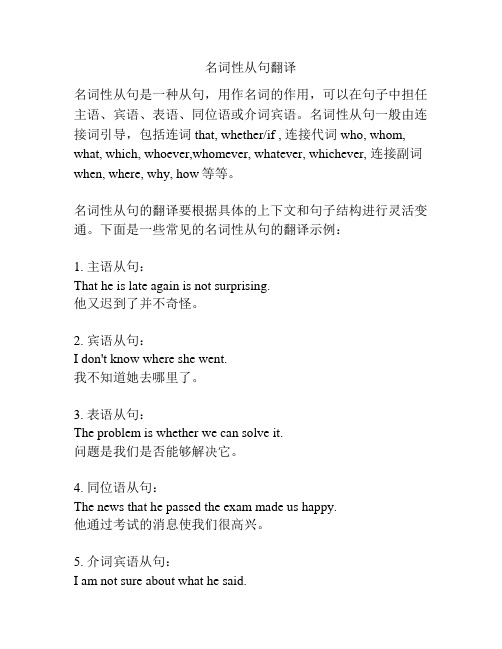
名词性从句翻译名词性从句是一种从句,用作名词的作用,可以在句子中担任主语、宾语、表语、同位语或介词宾语。
名词性从句一般由连接词引导,包括连词that, whether/if , 连接代词who, whom, what, which, whoever,whomever, whatever, whichever, 连接副词when, where, why, how等等。
名词性从句的翻译要根据具体的上下文和句子结构进行灵活变通。
下面是一些常见的名词性从句的翻译示例:1. 主语从句:That he is late again is not surprising.他又迟到了并不奇怪。
2. 宾语从句:I don't know where she went.我不知道她去哪里了。
3. 表语从句:The problem is whether we can solve it.问题是我们是否能够解决它。
4. 同位语从句:The news that he passed the exam made us happy.他通过考试的消息使我们很高兴。
5. 介词宾语从句:I am not sure about what he said.我不确定他说的是什么。
6. 间接引导名词性从句:He asked where I lived.他问我住在哪里。
7. 是否从句:I wonder whether/if she will come to the party.我想知道她是否会来参加派对。
8. 选择性从句:He asked me whether I preferred coffee or tea.他问我是喜欢咖啡还是茶。
9. 宾语从句(陈述句变为疑问句):Do you know what time it is?你知道现在几点钟吗?10. 宾语从句(连接代词):I wonder who is going to pick us up at the airport.我想知道谁会在机场接我们。
第12章名词性从句的翻译ppt课件
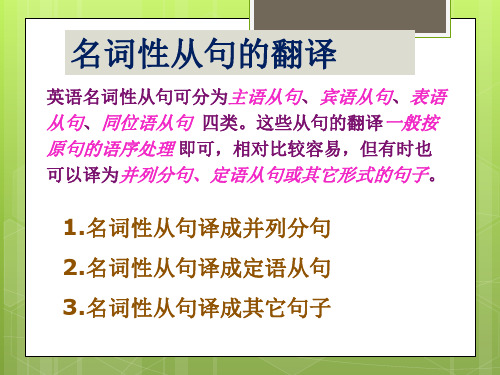
Not long ago the scientists made an exciting discovery that this “waste” material could be turned into plastics. (同位语从句)
名词性从句的翻译
英语名词性从句可分为主语从句、宾语从句、表语 从句、同位语从句 四类。这些从句的翻译一般按 原句的语序处理 即可,相对比较容易,但有时也 可以译为并列分句、定语从句或其它形式的句子。
1.名词性从句译成并列分句 2.名词性从句译成定语从句 3.名词性从句译成其它句子
1.译成并列分句
如果名词性从句包含两层以上的意思,需要把主句与从句 分开译。一般先译出从句,放在句首,然后用汉语的复指 代词“这”“那”,与主句的其他成分连成一句。同位语 从句的翻译与定语从句的翻译非常近似,可以将同位语从 句放在名词前,相当于前置的修饰语,但不必使用定语的 标志“的”字;可以保持原句的语序,译为后置的并列句, 加入冒号、破折号或“这样”、“这…”、“那就是”、 “即”等字眼;也可以改变原句的同位语结构,采用汉语 的无主句或其它方式的译法。
(宾语从句) 如果没有城市的支持, 简直难以想象会有大学、医院和大 企业, 甚至连科学技术也不会有。
4.We fail to learn that pain is the body's way of in-
forming the mind that we are doing something wrong, not necessarily that something is wrong.
翻译技巧 8 名词性从句的翻译
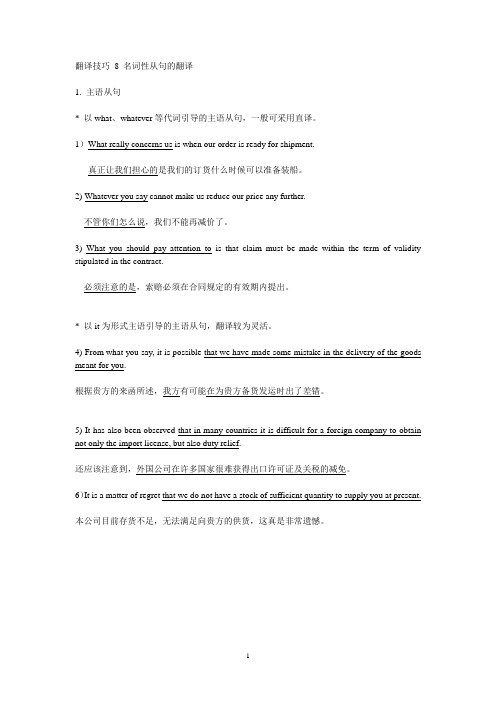
翻译技巧8 名词性从句的翻译1. 主语从句* 以what、whatever等代词引导的主语从句,一般可采用直译。
1)What really concerns us is when our order is ready for shipment.真正让我们担心的是我们的订货什么时候可以准备装船。
2) Whatever you say cannot make us reduce our price any further.不管你们怎么说,我们不能再减价了。
3) What you should pay attention to is that claim must be made within the term of validity stipulated in the contract.必须注意的是,索赔必须在合同规定的有效期内提出。
* 以it为形式主语引导的主语从句,翻译较为灵活。
4) From what you say, it is possible that we have made some mistake in the delivery of the goods meant for you.根据贵方的来函所述,我方有可能在为贵方备货发运时出了差错。
5) It has also been observed that in many countries it is difficult for a foreign company to obtain not only the import license, but also duty relief.还应该注意到,外国公司在许多国家很难获得出口许可证及关税的减免。
6)It is a matter of regret that we do not have a stock of sufficient quantity to supply you at present.本公司目前存货不足,无法满足向贵方的供货,这真是非常遗憾。
翻译4.5:名词性从句的翻译
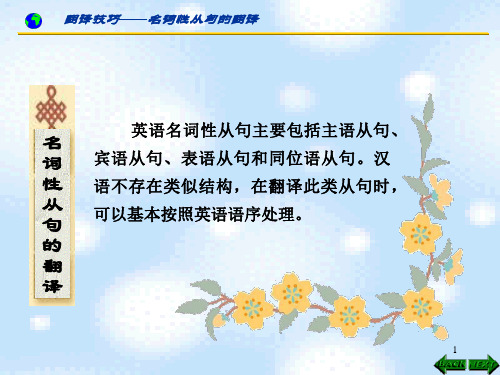
4) It is a matter of common experience that bodies
are lighter in water than they are in air.
物体在水中比在空气中轻,这是一种常识。
6
翻译技巧——1. 主语从句的翻译
discussions.
教授们和女生都发现,男孩子正在逐渐“接管”课堂讨论。
9
翻译技巧——1. 主语从句的翻译
3) It is imagined by many that the operations of the common mind can by no means be compared with these processes.
许多人认为普通人的思维活动根本无法与这些过程相比。
4) It was thought that this drug was blown into the bedroom through a tube in the form of a fine powder which the sleeper breathed in.
青少年现在购物更多了,这就会使他们在光顾的商店里花钱多。
2) That aspect has to be weighed against the fact that they might not help your career plans.
但这些工作可能无助于你的择业规划,你必须在这两个方面权 衡一下。
这些组织指控海军的计划违背了保护动物不受虐待的
联邦法律。
11
翻译技巧——2. 宾语从句的翻译
2) But critics wonder if dolphins can be trusted to
名词性从句带翻译
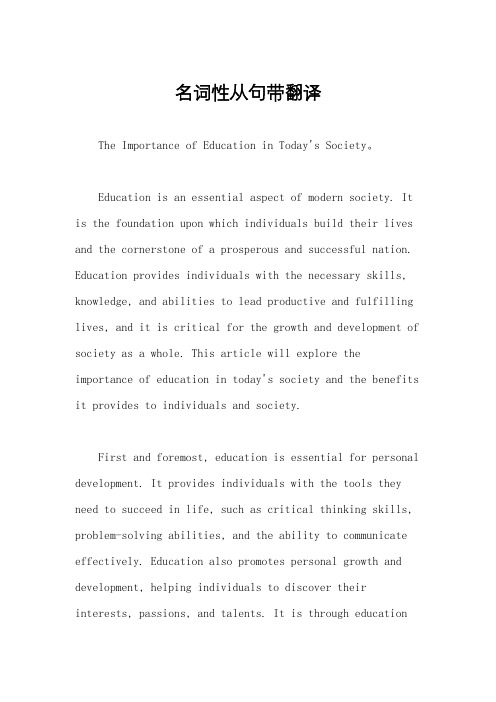
名词性从句带翻译The Importance of Education in Today's Society。
Education is an essential aspect of modern society. It is the foundation upon which individuals build their lives and the cornerstone of a prosperous and successful nation. Education provides individuals with the necessary skills, knowledge, and abilities to lead productive and fulfilling lives, and it is critical for the growth and development of society as a whole. This article will explore the importance of education in today's society and the benefits it provides to individuals and society.First and foremost, education is essential for personal development. It provides individuals with the tools they need to succeed in life, such as critical thinking skills, problem-solving abilities, and the ability to communicate effectively. Education also promotes personal growth and development, helping individuals to discover their interests, passions, and talents. It is through educationthat individuals can realize their full potential and achieve their goals.In addition to personal development, education is critical for economic development. In today's global economy, education is the key to success. It provides individuals with the skills and knowledge they need to compete in the workforce and contribute to the economy. A well-educated workforce is essential for the growth and development of businesses and industries, and it iscritical for the economic success of a nation.Education also plays a crucial role in promoting social mobility and reducing inequality. It provides individuals from all backgrounds with the opportunity to improve their lives and achieve their goals, regardless of their social or economic status. Education is a powerful tool for breaking down barriers and creating a more equitable society.Furthermore, education is essential for promoting democracy and civic engagement. It provides individualswith the knowledge and skills they need to participate in the democratic process and make informed decisions. Education also promotes civic responsibility, encouraging individuals to be active and engaged members of their communities.Finally, education is critical for promoting global understanding and cooperation. In today's interconnected world, education is essential for promoting cultural understanding and tolerance. It provides individuals with the knowledge and skills they need to communicate effectively with people from different cultures and backgrounds, promoting peace and cooperation on a global scale.In conclusion, education is essential for personal, economic, and social development. It provides individuals with the tools they need to succeed in life, contributes to the growth and development of society, and promotes democracy, social mobility, and global understanding. As such, education should be a top priority for individuals, governments, and societies around the world.。
名词性从句翻译

名词性从句翻译主语从句1、这个教材是否可用于我们的学校还未讨论过。
(whether)2、使我最感到吃惊的是他态度的突然转变。
(what)3、2010年世博会将在上海举行已成定局。
(that)所有国家都同意,绝不攻击带有红十字标记的任何物体。
(whatever)这次计划将如何执行仍需讨论。
(how)一本书是否畅销取决于诸多因素。
(Whether)(上海市高考题)以it为形式主语的主从复合句他看来不愿意对这件事作进一步的评论。
(seem)你喝了那么多咖啡难怪你睡不着。
(no wonder)据估计,飞到火星上来回一趟需要一年半多的时间。
(estimate) 他碰巧以前做过类似的练习。
(happen)他真的打算一路乘火车去莫斯科。
(true)一切物质都是原子构成的,这是众所周知的事实。
(fact)这种材料能否用在我们工厂还是一个问题。
(question)业已证明他们的建议在一定程度上是合理的。
(prove)原来他根本没出过国,也根本不是华侨。
(turn out)下一班火车什么时候去西藏通知了没有(announce)新产品销路好不好取决于它的质量。
(whether)据报道这种野生植物含有丰富的维生素。
(It)(上海市高考题)宾语从句汤姆希望成为任何一个能与他分享兴趣的人的朋友。
(whoever) 他们祖父当时也算是第一批就在这如今著名旅游胜地的地方安家的。
(what)除非下雨,这位老人每天都散步。
(except)我们问门卫办公室下午五点是否还开着。
(whether)我爸爸说我可以选任何一件看上去适合我的衣服。
(whichever) 我们应该仔细地取出任何可能对年轻人有害的东西。
(whatever)你能否告诉我为什么离开教室时不关灯(why)他除了喜欢偶尔下下棋外没多少别的爱好。
(except)以IT为形式并与的主从复合句不要想当然地认为所有问题通过一次讨论就能解决。
我们认为每个市民都讲礼貌是很重要的。
我们已把问题说清楚,吸烟对女性有更大的危害。
第五讲 名词性从句的翻译

第五讲名词性从句的翻译英语名词性从句包括主语从句、宾语从句、表语从句和同位语从句等,分别在复合句中充当主语、宾语、表语、和同位语。
(一)主语从句的译法I.“that + 从句的主语+ 从句的谓语+ 主句的谓语”、“It is + 形容词+ 从句”句型1.That the living conditions are improving is evident./ It is evident that the living conditions areimproving.生活条件在改善,这是很明显的。
/ 很明显,生活条件在改善。
2.It is important that the hotel receptionist make sure that guests are registered correctly.前台服务员应该确保每一位客人都登记无误,这点很重要。
/重要的是,前台服务员应该确保每一位客人都登记无误。
3.It’s probable that we will be a little late.我们很可能要迟到一会儿。
4.It was really astonishing that she refused to talk to her parents.令人吃惊的是,她竟然拒绝和父母谈话。
(常用于“It is + 形容词+ that 从句”结构的形容词有“clear, important, possible, strange, necessary, essential”等。
翻译时,先将that 后的主语从句翻译出来,然后加上“(这是)很+ 形容词”的结构。
但有时将形容词转换成副词短语,会使译文更符合汉语的表达习惯。
II.” It is + 名词+ that从句”句型: 翻译这类结构时,通常也会涉及“词类转换”和“语序调整”等翻译技巧。
常用于此结构的名词词组有“a fact, a pleasure, a pity, a pleasant thing, one’s duty, an hour, a shame, no easy job, good news, a waste of time”等例:1.That the climate around the world is changing is an accepted fact./ It is an accepted fac t that the climate around the world is changing.世界各地的气候都在变化,这是人所共知的事实。
4种名词性从句的翻译方法

• In July 1898, Curie and her husband got a great success that they discovered the radioactive element—polonium.
• 你来不来我不在乎。
• It seemed incredible that she should have lied to us. • 她居然对我们说谎,这真是不可思议。
• It is strange that she should have failed to see her own shortcomings.
works.【主谓结构作定语】
这是关于这台新型电气仪表如何运作的说明。
2024/8/8
12
同位语从句
常用连词that或链接副词来 引导,用以对某个名词作进 一步的解释或说明。翻译时 也可采取不同的方法。
2024/8/8
13
• 方法一:把同位语从句译成汉语联合复句中的一个分句。
• It was from these slender indications of scholarship that Dr. Weldon drew the conclusion that I was worthy to pass into Harrow.
绕着人工湖跑步的一个好处,就是不能抄近路回家。
The fact is that electronic computer are of great benefit to the development of science and technology.【主谓结构】 事实是电子计算机十分有利于科学技术的发展。
翻译4.5:名词性从句的翻译
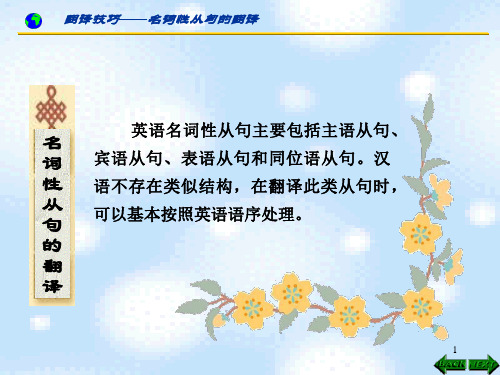
2) You have all heard it repeated that men of science work by means of induction and deduction.
你们都多次听说过, 科学家采用归纳法和演绎法进行工作。
3) He just took it for granted that he would pass the exam.
更严厉的批评认为,猿猴其实是在对他们的训练员们不自觉的 暗示作出反应。
14
翻译技巧——3. 表语从句的翻译
3) One of the reasons that therapy often takes so long is that, once you leave the safety and support of a session, you reenter the world where familiar people elicit the familiar reactions.
17
翻译技巧——4. 同位语从句的翻译
但在有些情况下,翻译时,同位语从句可以提前。
1) The fact that they are doing more shopping may result in their spending more money in stores they go to.
青少年现在购物更多了,这就会使他们在光顾的商店里花钱多。
whether animals such as chimpanzees and gorillas can develop a more elaborate system of communication are issues at present being researched.
名词性从句的翻译
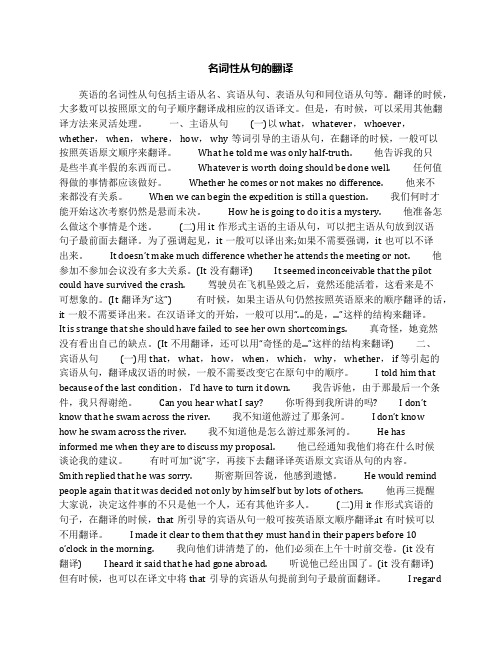
名词性从句的翻译英语的名词性从句包括主语从名、宾语从句、表语从句和同位语从句等。
翻译的时候,大多数可以按照原文的句子顺序翻译成相应的汉语译文。
但是,有时候,可以采用其他翻译方法来灵活处理。
一、主语从句(一)以what, whatever, whoever,whether, when, where, how, why等词引导的主语从句,在翻译的时候,一般可以按照英语原文顺序来翻译。
What he told me was only half-truth. 他告诉我的只是些半真半假的东西而已。
Whatever is worth doing should be done well. 任何值得做的事情都应该做好。
Whether he comes or not makes no difference. 他来不来都没有关系。
When we can begin the expedition is still a question. 我们何时才能开始这次考察仍然是悬而未决。
How he is going to do it is a mystery. 他准备怎么做这个事情是个迷。
(二)用it作形式主语的主语从句,可以把主语从句放到汉语句子最前面去翻译。
为了强调起见,it一般可以译出来;如果不需要强调,it也可以不译出来。
It doesn’t make much difference whether he attends the meeting or not. 他参加不参加会议没有多大关系。
(It没有翻译) It seemed inconceivable that the pilot could have survived the crash. 驾驶员在飞机坠毁之后,竟然还能活着,这看来是不可想象的。
(It翻译为“这”) 有时候,如果主语从句仍然按照英语原来的顺序翻译的话,it一般不需要译出来。
在汉语译文的开始,一般可以用“...的是,...”这样的结构来翻译。
名词性从句的翻译

“It is + 形容词+that 从句”
译法:先将“that从句”单独翻译出来,然后加上 “(这是)很+形容词”的结构。 有时将形容词转译成副词短语,会使译文更符合汉语 的表达习惯。
1.It was really astonishing that she refused to talk to her parents. A.她拒绝和父母交谈,这真令人吃惊。 B. 我们很可能要迟到一会儿。 2. It is strange that he should have failed to see his own shortcomings. A. 他竟然没有看出自己的缺点,这很奇怪。 B. 真奇怪,他竟然没有看出自己的缺点。
Translation of Nominal Clauses
I. Translation of Subject Clauses II. Translation of Object Clauses
III. Translation of Predicative Clauses
IV. Translation of Appositive clauses
(三)Convert into an object clause and put it after the noun.
There are clear indications that the war will soon be over. 有明显的迹象表明战争即将结束。
(四) Use punctuation marks or specific words
麻烦的是他们缺钱。 3.This is where the shoe pinches. 这就是问题的症结所在了。
IV. Appositive clauses
名词性从句翻译

decide whether you should go to collage or take a job.
5.以上所概括的要点证明了考试并不仅仅给我们提供分数。(more than)
The outlined important points prove that tests do more than just provide us with grades.
19.请再检查一遍,确保没有任何细节被忽略了。(overlook)
Please check it again and/to make sure that no details have been overlooked.
20.老师对学生们把注意力放在如何提高英语口语上感到
满意。(focus on)
The teacher felt satisfied that the students had focused their attention on how to improve their spoken English. 表语从句:
10.研究表明这新药是否对这病人有效还是一个问题。(remain)
The research indicates that it remains a question whether the new medicine will have any effect on the patient. 11.学生们逐渐认识到友谊胜
14.你该为刚才的所作所为向在场的人道歉。(apologize) You should apologize to the people present for what you have just done.
英语名词性从句的翻译

英语名词性从句的翻译英语名词性从句包括主语从句, 宾语从句, 表语从句和同位语从句, 在翻译这类从句时, 大多数可以按照原文的句序翻译成相应的汉语, 但是也有一些具体的处理方法, 下面我们结合一些实例加以说明:例1.How and when human language developed and whether animals such as chimpanzees and gorillas can develop a more elaborate system of communication are issues at present being researched, but as yet little understood.人类的语言是如何发展起来的, 是什么时候形成的, 诸如黑猩猩和大猩猩一类的动物是否会形成一种更加复杂的交流系统, 都是现阶段人们研究的课题, 但对此人们都知之甚少。
(主语从句)例2.How well the prediction will be validated by later performance depends upon the amount, reliability, and appropriateness of the information used and on the skill and wisdom with which it is interpreted. (95年考题)这些预测能在多大程度上被后来的成绩所证实取决于所使用的信息的量、可靠性和适合程度, 并取决于对信息作出解释的技能和智慧。
(主语从句)例3.It is often said that wide reading is the best alternative course of action but even here it is necessary to make some kinds of selection.人们常说, 大量阅读是可供选择的最佳方案, 但即使在这一方面, 也需要某些选择。
《名词性从句翻译》PPT课件
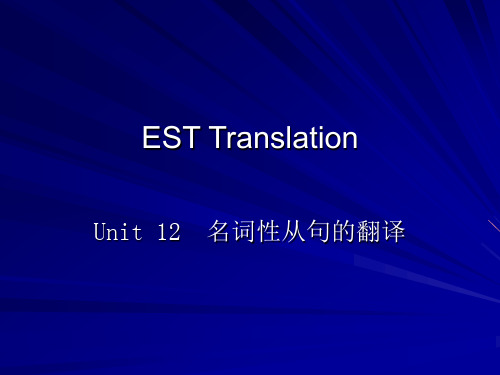
2. 宾语从句
EX1: I told him that I had to turn him down. EX2: Scientists are afraid that one day an even bigger 译ea文rt:hquake will hit the area around San Francisco.
(EEXX许12::建我 科平告 学,诉 家2他 担00我心8不有V2得朝:不一1拒日3绝旧5)他金。山周围地区还会发 E生X更3:大H的e h地as震in。formed me when they are to discuss
mEyX3p:ro他po已sa经l.通知我他们将在什么时候谈论我的建 E议界XE和。E4inX:思4sTt:oe想i为nm界’什so,st么th这ep爱oe对ro因yp大le斯ev多i坦et数ni的tsu人n学a是oll说ty难e最sah以s后oy解o震tko释撼teh清xe了p楚wl整a的hi个no。lw科e h学y
scientific and intellectual world.
2. 宾语从句
EX 5: I made it clear to them that they must hand in their papers before 10 o’clock in the morning.
E译X文6::I leave it to your own judgment whether you E交sXh卷o5。:uld我d向o他it.们讲清楚了的,他们必须在上午十时前 EEXX 76::I 我th让ink你i自t q己ui判te断tru,e这th件at事he该v不en该tu做re。d out to ESXh7a:ng他ri又-la冒. 险去香格里拉了,我觉得这件事千真万 E确EXfXi。n88i::sWh让ehd他aitn们thtw十eyo天.w做er的e a事sk,e他d t们o 两do天in就1做0 完da了ys。, they
- 1、下载文档前请自行甄别文档内容的完整性,平台不提供额外的编辑、内容补充、找答案等附加服务。
- 2、"仅部分预览"的文档,不可在线预览部分如存在完整性等问题,可反馈申请退款(可完整预览的文档不适用该条件!)。
- 3、如文档侵犯您的权益,请联系客服反馈,我们会尽快为您处理(人工客服工作时间:9:00-18:30)。
名词性从句的翻译
Substantive Clause Translation
包括主语从句、表语从句、宾语从句及同位语从句四类。
重点讲解同位语从句的翻译。
尤其是避免“即”、“:”、“——”之类的译法。
主语从句及翻译
(一)以what, who, whether, that, where, why, how, when等代词引导的主语从句翻译时一般可按照原文顺序翻译。
例如:
Why metals can conduct electricity is an interesting problem.
金属为什么能导电是一个有趣的问题。
That energy can be neither created nor destroyed is a very important law in physical science.
能量既不能创造也不能消灭是物理学的一条很重要的定律。
Whether an organism is a plant or an animal sometimes taxes the brains of a biologist. 一种生物是植物还是动物,有时使生物学家很伤脑筋。
When it was first invented is not known.
它最初是什么时候发明的,现在还不知道。
Where the water has gone can easily be answered.
水到哪里去了,这很容易回答。
(二)形式主语it +谓语+ that (whether)引导的从句,汉译时一般先译从句再译主句。
例如:
It is a matter of common experience that bodies are lighter in water than they are in air. 众所周知,物体在水中比在空气中轻。
It is no longer a question whether man can fly to the moon.
人能否飞上月球,现在已不再是什么问题了。
It is certain that we shall produce this kind of engine.
毫无疑问,我们将生产这种发动机。
表语从句及翻译
表语从句位于主句的连系动词之后,引导表语从句的从属连词和引导主语从句的从属连词相同。
汉译时,顺序不变。
例如:
The question is how the people can find an effective way to store the sun’s heat.
问题在于人们怎样才能找到一种有效的方式来储藏太阳热。
This is what the equation means.
这就是此方程式的含义。
That’s why the plants absorb water from the soil.
这就是植物从土壤中吸收水分的原因。
宾语从句及翻译
宾语从句既可以是动词的宾语,也可以是某些形容词或介词的宾语。
宾语从句也可以出现在由it作形式宾语的句子中,汉译时,顺序一般不变。
例如:
Scientists have long predicated that computers would one day help speed up the arduous task of translating texts.
科学家们早已预言,总有一天计算机将帮助我们加快艰巨的文字翻译工作。
We all know that cigarette smoking is hazardous to health and that alcohol abuse can kill.
我们都知道吸烟对健康有害,我们也知道酗酒会危害人的生命。
Nutritional experiments have made it evident that vitamins are indispensable for one’s health and growth.
营养实验证明,维生素对人们的健康和生长是不可缺少的。
同位语从句及翻译
英语中的同位语从句是用来说明它前面的某个名词的从句,它与其所修饰的名词在地位上是同等的。
同位语从句常用that, whether 或if引导,它们在从句中不充当任何句子成分。
汉译时可灵活处理,根据具体情况可采用合译、分译或转换等多种方法。
例如:
The suggestion that we should develop the natural resources in this region has been discussed.
关于我们应该开发本地区自然资源的建议已经被讨论过了。
There is no possibility that human beings will ever be controlled by robots.
人类不可能受机器人控制。
There is general acknowledgment that characteristics of an individual are a result of an interaction of genetics and environment.
众所周知,某一个体的特性是遗传和环境相互作用的结果。
There is no doubt that animal viruses can jump into humans.
毫无疑问,动物病毒能进入人体。
So far there is no proof that UFOs or spaceships from other planets do exist.
究竟有没有不明飞行物或来自其他行星的宇宙飞船,迄今为止尚无法证实。
经常与同位语从句连用的单词或短语包括:idea, fact, news, rumor, hope, belief, thought, doubt, proposition, suggestion, advice, agreement, message, probability, certainty, likelihood, evidence, on condition, on the supposition, on the ground(s), on the understanding, with the exception, in spite of the fact等。
